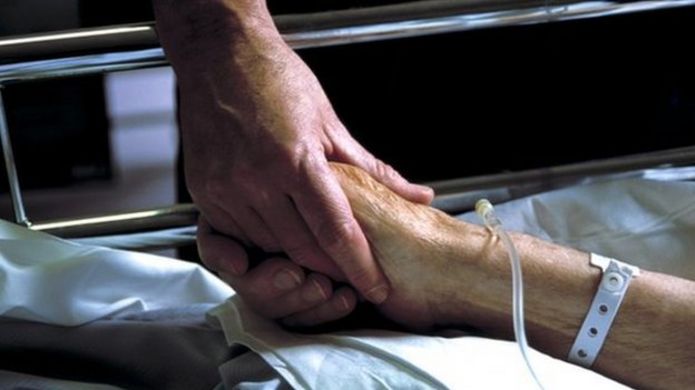My Life, My Choice
The BBC reports that a man from Inverness who has a life limiting condition has decided to travel to Switzerland so that he can end his life at a time of his own choosing, instead dying a slow and lingering death.
Now Colin Campbell seems of sound mind to me, he's not vulnerable, nor is he under any pressure to consider ending his own life - yet anyone in Scotland helping Colin to fulfil his own wishes runs the risk of becoming a convicted criminal.
The challenge for our lawmakers is to put a system in place that protects the vulnerable while allowing people like Colin to end their lives peacefully without turning those who help them into criminals.
http://www.bbc.com/news/uk-scotland-highlands-islands-39730961
Inverness man tells of assisted suicide decision
BBC Highlands & Islands

Image copyright - SCIENCE PHOTO LIBRARY Image caption - Assisted suicide is unlawful in Scotland
An Inverness man has spoken of his decision to end his own life in a clinic in Switzerland.
Colin Campbell, 56, has primary progressive multiple sclerosis.
He said his health had rapidly deteriorated over the last two years and he wanted to choose to die before he was not in a fit state to do so.
Assisted suicide is unlawful in Scotland. A move to change the law was defeated in a vote in the Scottish Parliament in 2015.
Mr Campbell, who is booked to go to a clinic in Basil next month, was first diagnosed with MS when he was 34, but had previously suspected he had a health condition because of a deterioration in his ability to play sports.
'Condemned man'
He uses a walking frame to move around his flat and a wheelchair when travelling outside of his home.
Mr Campbell, who formerly worked in IT, still has use of his hands and passes his time playing guitar.
However, he told BBC Radio Scotland's Kaye Adams Programme: "Having primary progressive MS means it will always get progressively worse and will eventually lead to loss of all functionality.
"I will lose use of my hands and won't be able to do anything. My voice will become slurred and I will not be able to feed myself."
Mr Campbell said he felt like a "condemned man confined in his cell on death row".
An Inverness man has spoken of his decision to end his own life in a clinic in Switzerland.
Colin Campbell, 56, has primary progressive multiple sclerosis.
He said his health had rapidly deteriorated over the last two years and he wanted to choose to die before he was not in a fit state to do so.
Assisted suicide is unlawful in Scotland. A move to change the law was defeated in a vote in the Scottish Parliament in 2015.
Mr Campbell, who is booked to go to a clinic in Basil next month, was first diagnosed with MS when he was 34, but had previously suspected he had a health condition because of a deterioration in his ability to play sports.
'Condemned man'
He uses a walking frame to move around his flat and a wheelchair when travelling outside of his home.
Mr Campbell, who formerly worked in IT, still has use of his hands and passes his time playing guitar.
However, he told BBC Radio Scotland's Kaye Adams Programme: "Having primary progressive MS means it will always get progressively worse and will eventually lead to loss of all functionality.
"I will lose use of my hands and won't be able to do anything. My voice will become slurred and I will not be able to feed myself."
Mr Campbell said he felt like a "condemned man confined in his cell on death row".
Cold and dark
He told the programme that requiring two stays in hospital within two months over the winter had convinced him that he did not want to face another winter.
On one of the two occasions, he had flu and had collapsed while trying to go to the toilet. He lay on the floor of his flat "in the cold and dark" until his landlord happened by chance to knock at his door.
Mr Campbell said he did not believe stem cell therapy was an option for him, but appreciated that there were people in similar situations to him that were using crowdfunding to pay for this type of treatment.
In 2015, MSPs rejected the Assisted Suicide Scotland Bill by 82 votes to 36 in a free vote following a debate at Holyrood.
The bill would have allowed those with terminal illnesses to seek the help of a doctor to end their own life.
Vulnerable people
Supporters said the plan had widespread public backing but critics argued a change in the law would be unethical.
Dr Gordon MacDonald, a spokesman for the Care Not Killing campaign, told the Kaye Adams Programme he believed assisted suicide should continue to be unlawful.
He said that in Oregon, a US state where assisted suicide is lawful, there were more than 2,000 requests last year for assisted suicide. However, only 133 people went ahead.
Dr MacDonald said: "This suggests a lot of people will express a desire, but don't choose to do so."
He said vulnerable people could be pressured into opting for assisted suicide.
Mr Campbell said safeguards could be put in place to allow the procedure to happen in Scotland.

